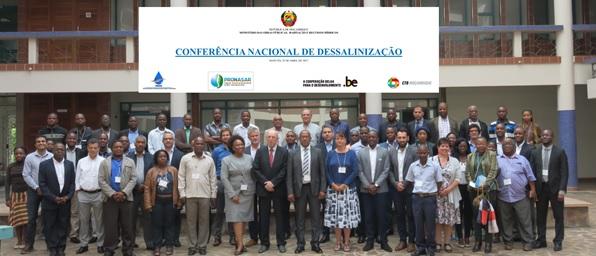BTC MOZAMBIQUE ORGANIZES NATIONAL CONFERENCE ON DESALINATION
On 25 April 2017, BTC Mozambique’s Water Gaza Project, in cooperation
with the National Water Directorate (DNAAS), organized the first national
desalination conference in Mozambique. The conference, which was attended by around
90 participants, brought together different stakeholders of the sector, such as
government officials from all the provinces and experts from the field. In
addition, private companies from South Africa, Portugal, and Mozambique were
invited to present their newest technologies and methodologies to turn salty
water into potable water for the local population, creating a valuable
opportunity between private and public actors to discuss desalination of water
in rural Mozambique. Presentations focused on the geological layout of
Mozambique, known water sources and boreholes, available technologies, reverse
osmosis processes, case studies of other parts of the world, and current gathered
data, facts and figures – all items which were also discussed in great detail
during the lively open discussions following the presentations.
The conference was an important step in Mozambique’s water plan:
although rarely applied in the country, desalination is an important option in
some of Mozambique’s provinces, as in some rural areas
70% of the water sources are too salty to safely
drink. In other parts, there are no potable fresh water sources at all, so
desalination of salted water (either from ocean or from aquifer) could be a
viable option to provide the local population with drinking water – especially
since Mozambique has almost 2500 km of coastline on the Indian Ocean.
For these reasons, BTC has been advocating to broaden the horizon in
search for water solutions, and has called for a focus on desalination in
Mozambique for quite some time. In this light, it is very promising to see a clear
shift in policy: apart from this first national desalination conference, a new
Desalination Task Force was recently set up within the National Water
Directorate. In addition, desalination pilot projects and studies are already
in the pipeline, and the new law on Water Management for Human Consumption,
which was presented during the conference by the Ministry of Health, now has a
chapter specifically on desalination.
Considering the above, the conference was a success. All the info from
the presentations and discussions held will be followed up closely and will be
used for the Mozambican government’s water plan for the period of 2017-2030,
which now undoubtedly will include several desalination programs.
Dernières actualité de ce projet
Pas d'actualité

